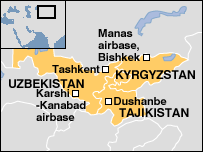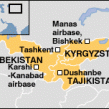
CRITICISM, SUSPICIONS MOUNT REGARDING CLOSED TALKS ON MANAS
Publication: Eurasia Daily Monitor Volume: 3 Issue: 109
By:

Talks aimed at settling the dispute over the future of the Manas coalition base in Bishkek ended without agreement, despite intense negotiations May 31-June 1. The U.S. delegation, headed by Robert Loftis, met with senior officials from the Kyrgyz Ministry of Defense and Ministry of Foreign Affairs in an attempt to address outstanding issues relating to the base. Although there was broad agreement on the need to cooperate against terrorism, beyond the political rhetoric 12 areas of contention remain. The Kyrgyz side emphasized the need to revise the original deployment agreement from 2001, hoping to gain more favorable terms, and the idea was approved to create a joint commission to investigate incidents at Manas. Both sides hope that meetings in the near future will result in a “mutually beneficial agreement and resolve all outstanding issues once and for all (Itar-Tass, June 2).
Washington planners are well versed in such diplomatic pressure and uncertainty over Manas, since the Kyrgyz intermittently step up their efforts to get what they hope will be a better deal from the United States. Such instances, however, are becoming more frequent, and the idea of settling the issue once and for all, although desirable in many respects, will prove unattainable in practical terms. President Kurmanbek Bakiyev’s press service sought to place the talks in a more positive context, based on the recent development of bilateral relations between Kyrgyzstan and the United States, deterioration of the security environment in Afghanistan, the continued terrorist threat within Central Asia, and the aspiration in both Washington and Bishkek to reach a mutually beneficial agreement. He seemed to signal a sense of security dependence on the United States that would not sit well with a Russian audience. As Kyrgyz Foreign Minister Alikbek Jekshenkulov said, “Diplomacy is a two-way process. We cannot be blamed of adopting a lopsided approach. We proceed from national interests, taking into account all the priorities and foreign political goals. This includes the country’s security, its economic interests, and the development of cultural and humanitarian cooperation with all countries.”
Yet President Bakiyev triggered this intensive round of discussions by making clear in mid-April that without an adequate revision of the agreement Bishkek could unilaterally eject the coalition base from the country.
The Kyrgyz delegation included Deputy Defense Minister Kubanychbek Oruzbayev, an air force major-general; Foreign Minister Jekshenkulov; Adamjan Joldoshev, head of the state agency for registering the rights to real estate under the Kyrgyz government; and Egemberdi Myrzabeko, head of the Manas international airport. A key player in these talks was Kyrgyz Security Council Secretary Miroslav Niyazov, who clearly had been tasked by Bakiyev with holding out for as much as he could extract from Washington. Rent for the use of the airport was the central and overriding issue during these talks, although the Kyrgyz side also pushed for issues such as environmental safety, agreed procedures for entering and leaving the airbase, and complying with air navigation rules, as well as the safety of flights of military aircraft, among others (24.Kg, Bishkek, May 31, June 1, 2).
A consistent theme in Russian press reports of these talks was their closed nature, almost attaching suspicious motives to the confidential nature of the negotiations. In fact, Itar-Tass highlighted the pressure for more openness in the process coming from Kyrgyz political rights activists, who demand that Bakiyev be “accountable, transparent, and ensure civil control over the actions of the sides” and avoid the duplicity that was the hallmark of the previous regime. Calls were also made to use the revenue from Manas for the state budget and not “to enriching a group of officials and members of their families.”
Karganbek Samakov, head of the parliamentary international affairs and inter-parliamentary relations committee, suggested that there are many questions being asked within the Kyrgyz parliament about the airbase. “These are the unsanctioned dumping of fuel by the coalition’s aircraft, supplies of fuel and lubricants to the base, the rent payment, and other issues,” Samakov said. He contributed to speculation that the Bakiyev regime is hoping to use the financial benefits of Manas for the kind of corrupt enrichment pursued by former president Askar Akayev in the past. “But for some reasons that remain unclear, the government keeps the parliament in the dark on this information, and we are still unaware of when the negotiations on new terms for the stationing in Kyrgyzstan will begin,” he said. Kyrgyz political opposition groups are also pushing for a greater role for parliament in the future of Manas. In any case Samakov pointed out that any agreement would require the ratification of the Kyrgyz parliament (Interfax, Itar-Tass, June 1, 2).
Meanwhile there is no doubt concerning the future of the Russian base at Kant, near Bishkek. Even with a firm, long-term bilateral security arrangement that matches that of Moscow-Bishkek or the multilateral tie-ins that help make Kant more stable and durable, Manas will always have a degree of uncertainty surrounding its durability. Pressure on the Bakiyev regime to press for the possible ejection of the U.S. and coalition militaries from the country clearly comes from Russia, spurred by Uzbekistan’s termination of Karshi-Khanabad for the United States. Moscow also benefits by raising the stakes within Kyrgyzstan, capitalizing on frustration with the so-called color revolution, as more people in Bishkek ask about the financial dividends of Manas.




